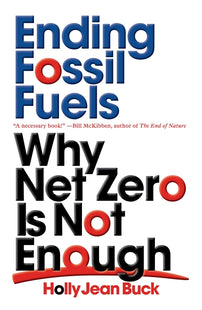Ending Fossil Fuels: a Letter from the Editor
"The main intervention we wanted to make with this book, in my opinion, was to make the case clearly and strongly that we have been duped into thinking that climate change is a problem of consumption rather than production."
–Rosie Warren, editor

I first came across Holly’s work when her name cropped up next to Andreas Malm’s as one of the editors of a proposed collection of essays on geoengineering. We felt that the topic would be best-served by a single-authored through-written book, and when I spoke with Andreas about the idea, he recommended Holly for the task. The result was Holly’s excellent debut After Geoengineering.
So when Verso’s editorial team started talking about the net zero discourse, Holly was an obvious choice for me to pitch the idea of a book. At the beginning of 2020 I wrote to her:
I wanted to feel you out about a possible new project. We were talking in house about the new discourse around 'net zero' emissions and the way that companies are using carbon offsetting to make themselves appear more climate-friendly without actually changing any of their carbon-emitting practices, including those extracting fossil-fuels.
We were wondering whether you'd be interested in writing a short and polemic book taking apart the notion of 'net zero' emissions and the way it is being used to green-wash fossil capital?
We'd propose a title
NET ZERO IS NOT ZERO
Holly wrote back to say she’d be interested, that the way the topic had been going had annoyed her to the point where she was eager to write something polemical and could do so quickly. As is our usual process at Verso, Holly put together a proposal in which she set out her vision for the book, centred on three questions: Why are we discussing net zero instead of actual zero? What does this compromise for net zero rather than actual zero portend? And what should people committed to real climate action do about all this net zero talk?
We had a number of conversations about how to approach the book, how much should be about the now-dominant discourse of ‘net zero’, and how to present the alternative. Obviously, there has been a huge growth in interest and activism around climate change in the last few years, and it’s an area of Verso’s list that has grown very rapidly in response. The main intervention we wanted to make with this book, in my opinion, was to make the case clearly and strongly that we have been duped into thinking that climate change is a problem of consumption rather than production. That has lead to all kinds of moralist, individualist and private responses – carbon footprints and planting trees to ‘offset’ emissions. To me the point of this book is to focus our attention on the fossil fuel industry as the point of production, and one that will pull every trick in the book to justify its continued existence; it isn’t going to simply wither away without intentional intervention. So this book fundamentally tackles the question: what would it mean to shut down the fossil fuel industry, and how do we get there?
One of the things that I love about Holly’s work, and respect about her as a scholar, is that she does not shy away from the real complexities of climate change mitigation. Her first book tackled a set of really difficult questions around climate intervention, and this one does a similar job of contemplating what she calls the ‘hard realities’ we have to confront to end the fossil fuel industry. The book ended up structured around three sections. The first, ‘The Cruel Optimism of Net Zero’, lays out the case against net zero as a useful framework for climate politics. The second, ‘Five Ways of Looking at Fossil Fuel Phaseout’, works through the cultural, infrastructural, geopolitical, technological and political ways of thinking about phaseout and the changes that are necessary. The final section, ‘A Phaseout Toolbox for the 2020s’ lays out five demands to pursue, including the nationalisation of fossil fuel companies. As with After Geoengineering the cherry on the cake is that Holly is a really skillful writer, as interested in engaging the reader’s imagination as presenting her ideas with a really refreshing clarity, which results in another book that far exceeds whatever my expectations might have been when I commissioned it.
–Rosie Warren, editor
Ending Fossil Fuels: Why Net Zero is Not Enough by Holly Jean Buck is one of our Verso Book Club selections in November. Find out more here!

